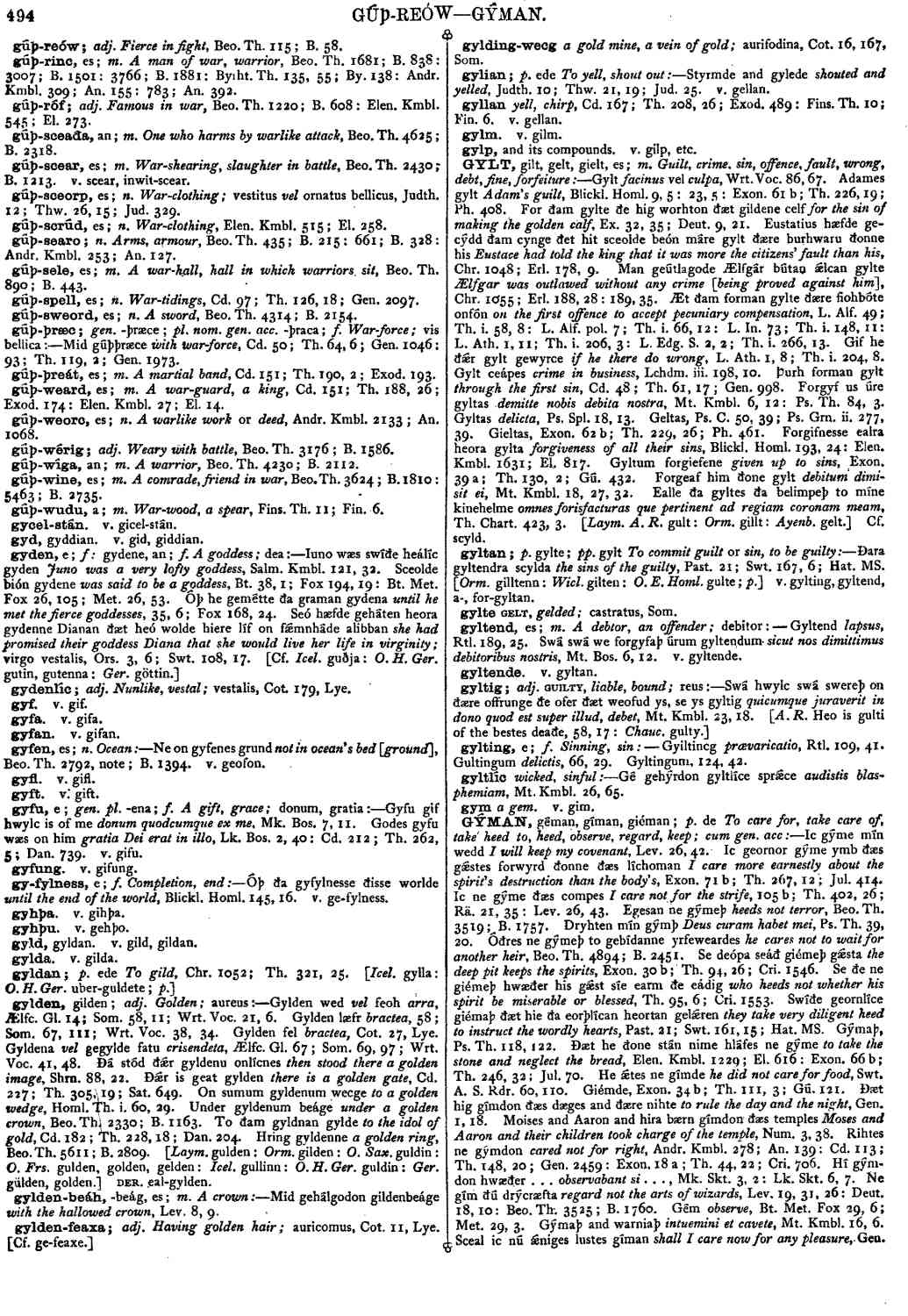GÝMAN
- verb [ weak ]
-
Ic gýme mín wedd
I will keep my covenant,
- Lev. 26, 42 .
-
Ic geornor gýme ymb ðæs gǽstes forwyrd ðonne ðæs líchoman
I care more earnestly about the spirit's destruction than the body's,
- Exon. 71 b ;
- Th. 267, 12 ;
- Jul. 414 .
-
Ic ne gýme ðæs compes
I care not for the strife,
- 105b ;
- Th. 402, 26 ;
- Rä. 21, 35 :
- Lev. 26, 43 .
-
Egesan ne gýmeþ
heeds not terror,
- Beo. Th. 3519 ;
- B. 1757 .
-
Dryhten mín gýmþ
Deus curam habet mei,
- Ps. Th. 39, 20 .
-
Óðres ne gýmeþ to gebídanne yrfeweardes
he cares not to wait for another heir,
- Beo. Th. 4894 ;
- B. 2451 .
-
Se deópa seáð giémeþ gǽsta
the deep pit keeps the spirits,
- Exon. 30 b ;
- Th. 94, 26 ;
- Cri. 1546 .
-
Se ðe ne giémeþ hwæðer his gǽst síe earm ðe eádig
who heeds not whether his spirit be miserable or blessed,
- Th. 95, 6 ;
- Cri. 1553 .
-
Swíðe geornlíce giémaþ ðæt hie ða eorþlícan heortan gelǽren
they take very diligent heed to instruct the wordly hearts,
- Past. 21 ;
- Swt. 161, 15 ;
- Hat. MS. Gýmaþ ;
- Ps. Th. 118, 122 .
-
Ðæt he ðone stán nime hláfes ne gýme
to take the stone and neglect the bread,
- Elen. Kmbl. 1229 ;
- El. 616 ;
- Exon. 66 b ;
- Th. 246, 32 ;
- Jul. 70 .
-
He ǽtes ne gímde
he did not care for food,
- Swt. A. S. Rdr. 60, 110 .
-
Giémde,
- Exon. 34 b ;
- Th. 111, 3 ;
- Gú. 121 .
-
Ðæt hig gímdon ðæs dæges and ðære nihte
to rule the day and the night,
- Gen. 1, 18 .
-
Moises and Aaron and hira bærn gímdon ðæs temples
Moses and Aaron and their children took charge of the temple,
- Num. 3, 38 .
-
Rihtes ne gýmdon
cared not for right,
- Andr. Kmbl. 278 ;
- An. 139 :
- Cd. 113 ;
- Th. 148, 20 ;
- Gen. 2459 ;
- Exon. 18 a ;
- Th. 44, 22 ;
- Cri. 706 .
-
Hí gýmdon hwæder ...
observabant si...,
- Mk. Skt. 3, 2 ;
- Lk. Skt. 6, 7 .
-
Ne gím ðú drýcræfta
regard not the arts of wizards,
- Lev. 19, 31, 26 :
- Deut. 18, 10 ;
- Beo. Th. 3525 ;
- B. 1760 .
-
Gém
observe,
- Bt. Met. Fox 29, 6 ;
- Met. 29, 3 .
-
Gýmaþ and warniaþ
intuemini et cavete,
- Mt. Kmbl. 16, 6 .
-
Sceal ic nú ǽniges lustes gíman
shall I care now for any pleasure,
- Gen.18, 12 .
-
Ða ðe bet cunnon sceolon gýman óðra manna
those who know better are to take care of other men,
- Homl. Th. ii. 282, 1 ;
- Ps. Th. 77, 10 ;
- Exon. 31 a ;
- Th. 96, 5; Cri. 1569 .
-
Gif his ðé géman lyst
if you pleased to care about it,
- Bt. Met. Fox 31, 2 ;
- Met. 31, 1 .
-
Gýman ðæs grundes
to take charge of the abyss,
- Cd. 18 ;
- Th. 22, 31, 25 ;
- Gen. 349, 346 .
Bosworth, Joseph. “GÝMAN.” In An Anglo-Saxon Dictionary Online, edited by Thomas Northcote Toller, Christ Sean, and Ondřej Tichy. Prague: Faculty of Arts, Charles University, 2014. https://bosworthtoller.com/17734.
Checked: 1